From Digestion to Detox: The Healing Magic of Papaya
Published: May 21, 2025 at 10:06:11 AM UTC
Last updated: December 24, 2025 at 11:11:37 AM UTC
Papaya is more than just a tasty tropical fruit. It's a superfood that boosts your health in many ways. Its sweet taste and bright color come from nutrients that help your body and skin. This article will show you how papaya can make your diet healthier and improve your lifestyle.
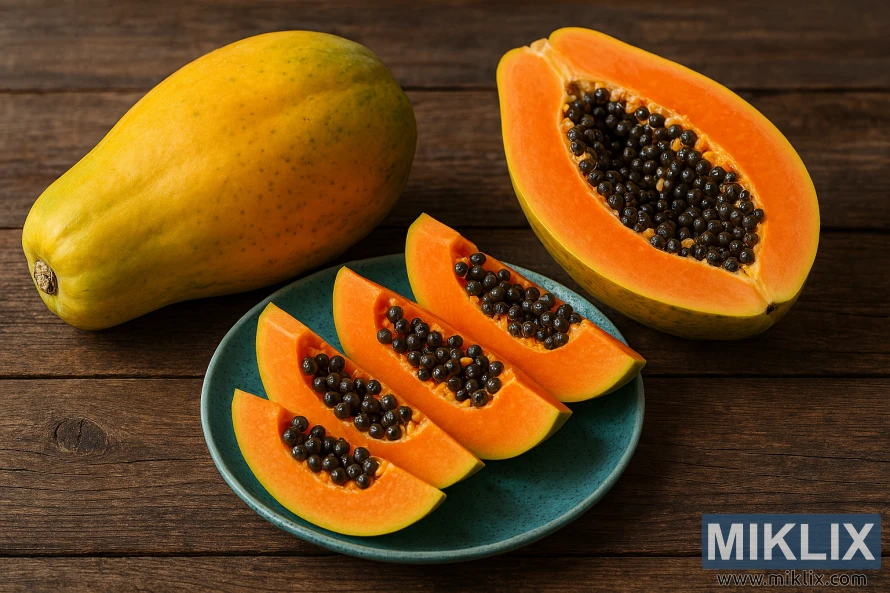
Key Takeaways
- Papaya is considered a superfood due to its rich nutritional profile.
- It offers significant health benefits, including improved digestion and reduced inflammation.
- This tropical fruit supports skin health with its vitamins and antioxidants.
- Incorporating papaya into your diet can promote overall wellness.
- Papaya's versatile flavor makes it easy to add to various dishes.
Introduction to Papaya
Papaya, also known as Carica papaya, is a tropical fruit loved for its taste and nutrients. It has a sweet flavor and soft, vibrant flesh. This fruit has traveled from Central America to sunny places like Hawaii and the Philippines.
The papaya fruit has a pear-like shape and a bright orange interior with small black seeds. It's versatile and can be eaten fresh, blended into smoothies, or added to salads. Adding papaya to your diet brings flavor and health benefits that people worldwide are interested in.
Nutritional Profile of Papaya
A medium-sized papaya has about 119 calories. This makes it a low-calorie choice full of important nutrients. Papaya is not just low in calories; it's also packed with vitamins and minerals that are good for your health.
This tasty fruit has more than 200% of the daily vitamin C you need. It also has vitamin A, which is great for your eyes. Plus, it has folate, which helps your cells grow and DNA work right.
Papaya is also full of dietary fiber, which is good for your digestion and gut health. It has small amounts of potassium, magnesium, and calcium too. These minerals add to papaya's nutritional value, making it a great choice for your diet.
To sum up, papaya's mix of calories and nutrients makes it a fruit that's not only filling but also supports your daily nutritional needs.
Antioxidant Properties of Papaya
Papaya is packed with antioxidants, making it a great ally for your health. The antioxidants in papaya, like lycopene and zeaxanthin, fight free radicals in your body. This helps lower oxidative stress, which is linked to many health problems.
The antioxidants in papaya do more than just keep you healthy. Studies show they might protect against diseases like Alzheimer’s and certain cancers. Papaya's carotenoids are also more easily absorbed by the body than those in other fruits and veggies.
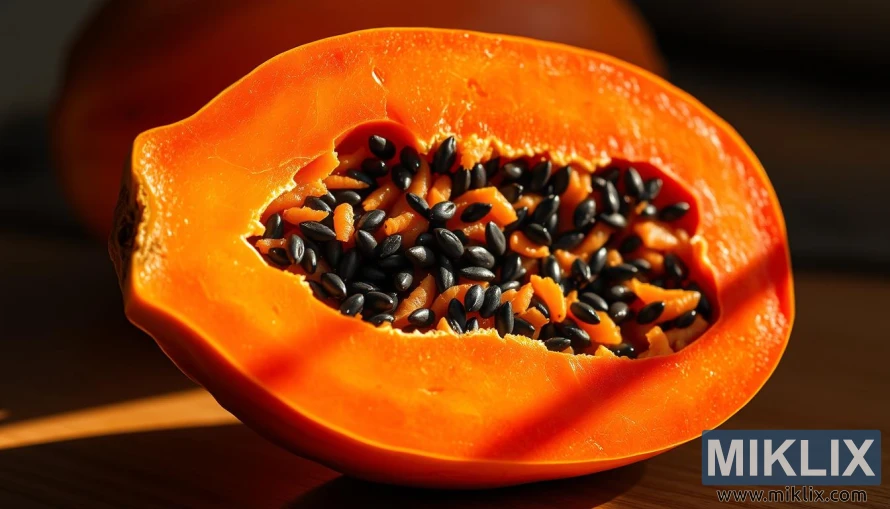
Eating papaya can increase your intake of these important nutrients. This supports a healthier lifestyle. Regularly eating papaya may also boost your body's defenses, helping you live life more fully.
Heart Health Benefits of Papaya
Eating papaya can greatly improve heart health. This tropical fruit is packed with antioxidants and fiber. These are key for a healthy heart. Antioxidants fight off harmful stress, and fiber helps control cholesterol.
Studies show that papaya can lower cholesterol. It has lycopene and vitamin C, which are good for the heart. These nutrients help balance good and bad cholesterol levels.
- Rich in antioxidants that protect heart tissues.
- High fiber content aids in cholesterol management.
- Lycopene and vitamin C support cardiovascular functions.
Adding papaya to your diet can boost heart health. It's also tasty in smoothies, salads, or as a fresh snack. Making papaya a part of your meals is easy and beneficial.
Digestion and Gut Health
Papaya is great for your digestion and gut health. It's full of dietary fiber, which helps your digestive system work better. This fiber keeps your bowel movements regular and prevents constipation.
Papaya also has the papain enzyme, which breaks down proteins. This helps with digestion and makes it easier for your body to absorb nutrients. Many people with digestive issues like irritable bowel syndrome (IBS) find relief by eating papaya.
Papaya's fiber and papain enzyme make it a strong supporter of digestive health. Adding papaya to your meals can improve your gut function and overall health.
Anti-Inflammatory Effects
Papaya has strong anti-inflammatory benefits, thanks to its antioxidants. These include vitamins and carotenoids that help reduce inflammation. Chronic inflammation can lead to serious health problems like arthritis and heart disease. Eating papaya can help lower these inflammation levels.
Vitamin C in papaya boosts the immune system and fights inflammation. Carotenoids in papaya support healthy cells. This helps the body fight chronic inflammation and diet-related issues.
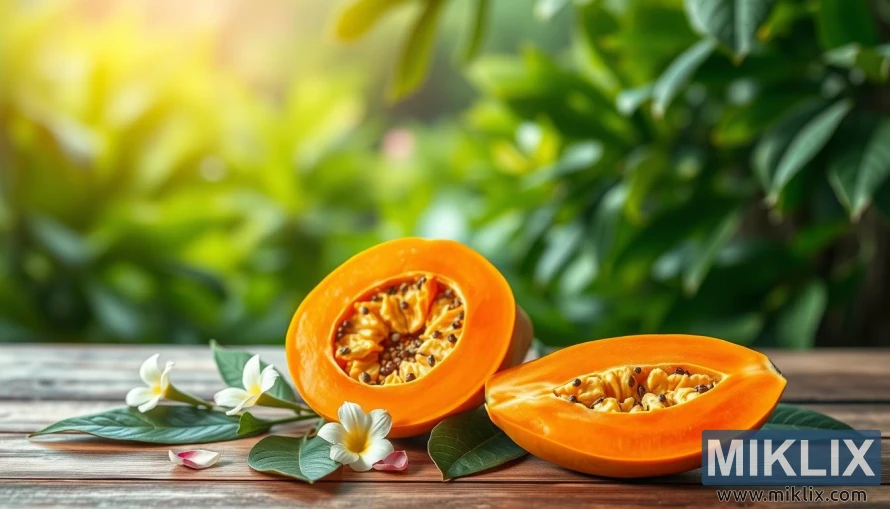
Cancer Prevention Potencial
Papaya is getting attention for its role in fighting cancer. Lycopene, found in papaya, is a key player. Studies show that eating more lycopene might lower prostate cancer risk. It also helps slow down some cancers.
Papaya's benefits go beyond lycopene. It's packed with antioxidants that protect cells and fight oxidative stress. Eating papaya can be a great way to boost health and possibly reduce cancer risks.
Bone Health and Nutritional Importance
Papaya is great for your bones because it's full of vitamin K. This vitamin helps your body absorb calcium better. Calcium is important for strong bones.
Eating papaya can help prevent bone breaks and make bones stronger. This is very important as we get older.
Adding papaya to your meals is good for your bones. It's a tasty way to keep your bones strong. Eating papaya makes your bones healthier and supports a better lifestyle.
Immune System Support
Papaya is a powerhouse for immune support, thanks to its high vitamin C. This nutrient strengthens the immune system. It acts as a powerful antioxidant, helping the body fight off infections and diseases. Vitamin A in papaya also boosts immune function, making it a great addition to a healthy diet.
Adding papaya to your meals boosts your intake of immune-boosting foods. Here are some ways to enjoy papaya:
- Adding fresh papaya chunks to salads for a tropical twist.
- Blending papaya into smoothies for a nutritious breakfast option.
- Using papaya in salsas to pair with grilled fish or chicken.
- Snacking on dried papaya as a healthy treat.
Adding papaya to your diet brings delicious flavors and vitamin C benefits. It supports overall health. Making papaya a staple can boost your immunity and promote a healthier lifestyle.
Skin Benefits of Eating Papaya
Papaya is packed with benefits for your skin. It's full of antioxidants that protect your skin from the sun and pollution. Using papaya in your skincare routine can make your skin look radiant and young.
Vitamin C and lycopene in papaya fight off aging signs. They help your skin look fresh and smooth. Eating papaya can make your skin feel soft and look alive.
Hair Health and Nourishment
Papaya is more than just a tasty fruit; it's great for your hair too. It's packed with vitamin A, which is key for healthy hair. This vitamin helps make sebum, a natural oil that keeps hair soft and shiny.
Papaya also has vitamin C, which helps make collagen. Collagen is important for strong hair follicles and healthy hair growth. So, papaya is a great food for anyone wanting strong and shiny hair.
Adding papaya to your meals is simple and fun. Here are some ideas:
- Add fresh papaya to fruit salads.
- Blend it into smoothies for a refreshing drink.
- Use it as a topping for yogurt or oatmeal.
By making papaya a part of your diet, you can naturally improve your hair care routine.
How to Incorporate Papaya into Your Diet
Papaya is a delicious addition to any meal. It's easy to add to your diet in many ways. You can simply slice fresh papaya and enjoy it as a snack. Its sweetness pairs well with other fruits, making it a tasty and healthy choice.
Smoothies are another great option. Mixing papaya with spinach, banana, or yogurt makes a creamy, nutritious drink. These smoothies are perfect for breakfast or a mid-day pick-me-up.
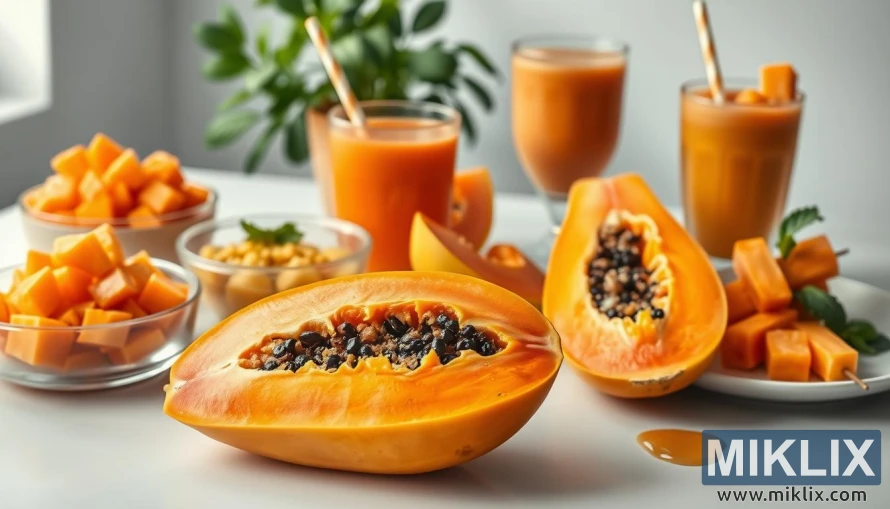
For those who love to cook, try adding papaya to salads or salsas. A papaya salsa is amazing with grilled fish or chicken. You can also add papaya cubes to a green salad for a unique twist. These ideas show how versatile papaya is and how it can be enjoyed in many ways.
Potential Risks and Considerations
Papaya is a tasty and healthy fruit, but it comes with some risks. People allergic to latex might react to papaya because of its similar proteins. Symptoms can vary from mild to severe, so it's important to be aware if you have this allergy.
It's also key to check the fruit's ripeness. Unripe papaya has more latex, which can be risky, like during pregnancy. It might cause contractions or other problems. So, pregnant women and those trying to get pregnant should be careful with unripe papaya.
To avoid risks, it's best to eat ripe papaya. This way, you get all the good stuff without the dangers of unripe fruit. Talking to a doctor about papaya allergies or concerns can also help you feel safer.
Choosing and Storing Papaya
When picking papaya, look for fruits with skin that's turning from green to yellow or orange. This color change means it's ripe. A ripe papaya will feel slightly soft when you press it gently. Also, check for smooth skin without any blemishes or dark spots for the best taste.
To keep papaya fresh, store it in the fridge once it's ripe. The cold helps slow down ripening and keeps it firm. If your papayas are not yet ripe, leave them at room temperature. They'll ripen in just a few days, ready to add sweetness to your meals.
Conclusion
Papaya is more than just a tasty tropical fruit. It's a key player in boosting overall wellness. It's packed with antioxidants, vitamins, and minerals that are good for your heart, digestion, and skin.
This summary highlights papaya's role in strengthening your immune system and fighting inflammation. It's a must-have in a healthy diet. Eating it regularly can improve your digestion and help prevent serious diseases. This makes it a great choice for your meals.
In the end, adding papaya to your daily meals can greatly improve your health. You can enjoy it fresh, in smoothies, or in salads. Papaya is a nutrient-rich fruit that can help you live a healthier life.
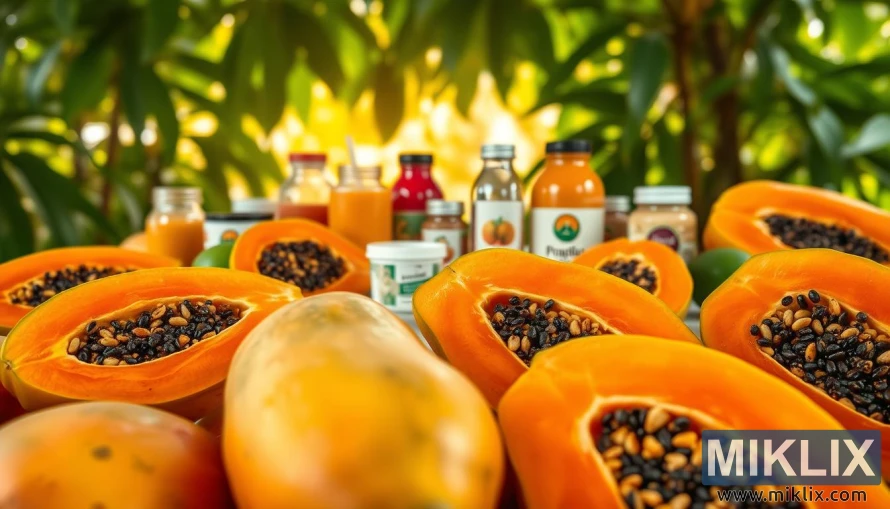
Further Reading
If you enjoyed this post, you may also like these suggestions:
- Fuel Your Fitness: How Glutamine Supplements Boost Recovery and Performance
- From Gut Health to Weight Loss: The Many Benefits of Glucomannan Supplements
- The Sweet Truth: How Strawberries Boost Your Health and Wellness
